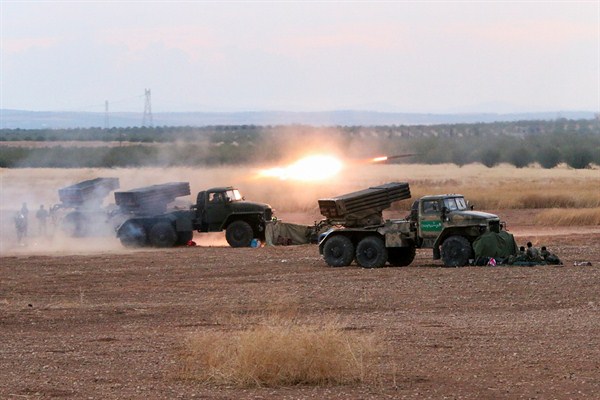Syria’s most successful rebel alliance may have just barely avoided breaking apart. Over the spring and summer of this year, the coalition of Islamist rebel groups known as Jaish al-Fateh, or the Army of Conquest, scored a series of dramatic victories over the regime of Bashar al-Assad in northwest Syria. But in the past several weeks, just as Jaish al-Fateh announced a major new offensive, one of its most hard-line factions, Jund al-Aqsa, very publicly quit the coalition. The acrimony that has followed the withdrawal of Jund al-Aqsa—an ultra-extreme splinter of al-Qaida’s Syrian affiliate, Jabhat al-Nusra—has exposed the persistent and probably unresolvable divisions among Syria’s rebels. And the announcement from rebel corners last week that Jund al-Aqsa may rejoin Jaish al-Fateh does not mean these divisions are going away.
Northern rebels formed the Jaish al-Fateh operations rooms, a kind of coordination cell, in March 2015 with the aim of capturing the city of Idlib, the capital of Syria’s northwest Idlib province. The coalition centers on Jabhat al-Nusra and the Salafist rebels in Ahrar al-Sham, but it also includes five smaller factions that range from less ideological brigades to Jund al-Aqsa. Thanks in part to newly coordinated and generous backing from Saudi Arabia, Turkey and Qatar, Jaish al-Fateh was able to not only take Idlib in days last spring, but also overrun a series of key regime military bases and almost entirely drive the regime from the province. In weeks, Jaish al-Fateh had made enough headway that it posed a real threat to the regime’s strongholds in central and coastal Syria.
Last month, despite an ongoing Russian-backed regime counteroffensive that seems to have largely targeted Jaish al-Fateh—rather than the self-proclaimed Islamic State, as Moscow first claimed it would—the rebel coalition announced it would launch a new offensive to take central Hama province. But less than two weeks later, Jund al-Aqsa declared its withdrawal from the coalition in the most controversial terms possible: It not only quit, it nearly accused some of its former allies of apostasy. Rumors swirled that Jabhat al-Nusra, one of Jaish al-Fateh’s two core groups, had also suspended its role in the coalition.

